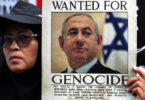SKRYHALIVKA (Reuters): Ukrainian pensioner Nadiya Ignatiy says she has had the plum and cherry trees in her garden cut down for firewood since the government raised gas prices late last year. In next month’s election, she will vote against President Petro Poroshenko in favour of an opponent who has pledged to restore the gas subsidies that were scaled back to secure an international bailout. “We cleared the garden,” she said in her house in the village of Skryhalivka, 80 km (50 miles) southwest of Kiev. “Not just me, other people are doing it now… previously you could heat with gas but now it’s a problem.”
Such frustrations could tip the balance in the March 31 election against Poroshenko, whose market-oriented reforms have helped stabilise a country battling Russian-backed separatism and encouraged Western investors wary of pervasive corruption. Poroshenko was elected in 2014 after protests ousted a Kremlin-friendly president and sent the government and the West on a collision course with Russia: Russia annexed Crimea and supported the overthrow of government rule in eastern Ukraine.
An influential businessman who had made a fortune from confectionery, he pledged to take the ex-Soviet country out of Russia’s orbit and restore control over the east in a matter of weeks. The latter has not happened, but he has overseen an uneasy stalemate with separatist-held regions and ended a steep recession, with around 3.4 percent growth last year. Living standards, however, have continued to decline. The average monthly wage has dropped the equivalent of almost $80 since 2013 and Ukrainians need more than three times as many local hryvnia to buy a dollar as they did then. Inflation peaked at 43 percent in 2015 and the price of a cubic meter of gas is almost 12 times what it was in 2013.
Since the revolution, “nothing has changed substantially for the better,” said Nadiya Yurchenko, 79, who hoped for a higher pension, heating allowance and better healthcare as well as peace with Russia when she voted for Poroshenko in 2014. Poroshenko won the first round outright in 2014, but many polls have shown the election frontrunner this time to be Yulia Tymoshenko, a former prime minister and fiery campaigner who compares the gas price rise to “genocide”. Another candidate who has surged in February is comic actor Volodymyr Zelenskiy, a political novice and largely an unknown quantity.
“For the IMF and most of Ukraine’s western partners, Poroshenko is a lesser evil, he is an acceptable partner,” said analyst Volodymyr Fesenko. However, “with their requirement for raising the price of gas and utility tariffs, the IMF paradoxically ends up giving political help to those whom it fears”, he said. Subsidised gas for households is a source of corruption in Ukraine because businesses divert it for their own use to avoid paying market prices, draining money from the state budget.






